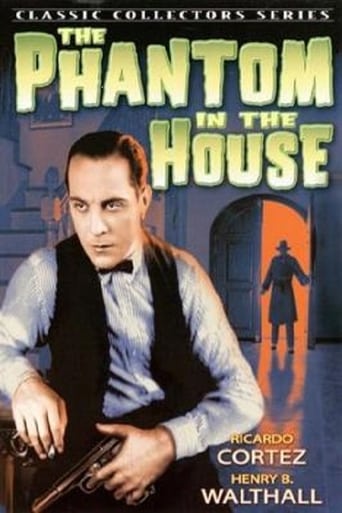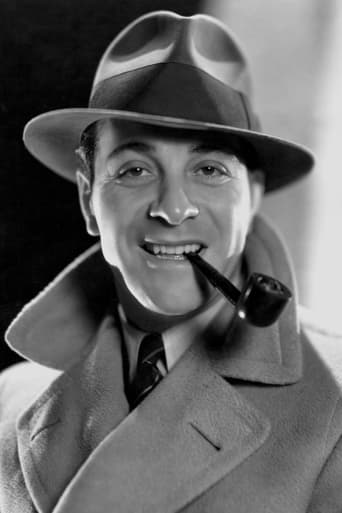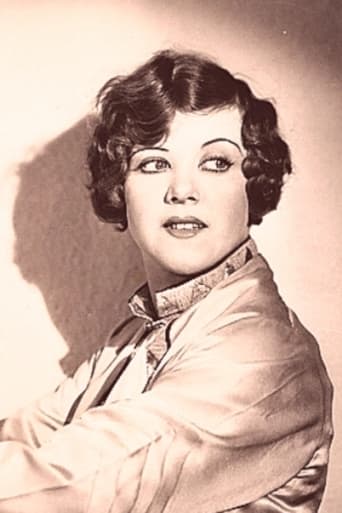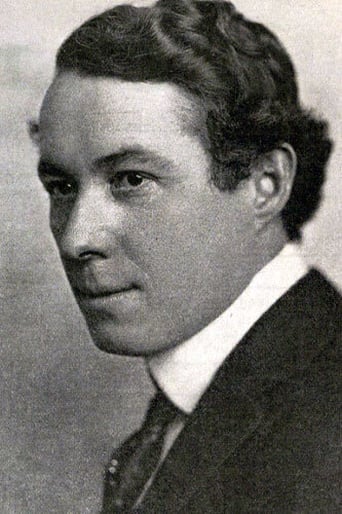The Phantom in the House (1929)
A man is blamed for a murder that was actually committed by his wife.
Watch Trailer
Free Trial Channels
Cast


Reviews
Excellent, a Must See
The tone of this movie is interesting -- the stakes are both dramatic and high, but it's balanced with a lot of fun, tongue and cheek dialogue.
This movie tries so hard to be funny, yet it falls flat every time. Just another example of recycled ideas repackaged with women in an attempt to appeal to a certain audience.
The tone of this movie is interesting -- the stakes are both dramatic and high, but it's balanced with a lot of fun, tongue and cheek dialogue.
The Phantom in the House (1929) ** (out of 4)Peggy (Grace Valentine) accidentally kills her lover just as her husband Boyd (Henry B. Walthall) walks in. Boyd agrees to say he did the crime and spends the next fifteen-years in prison. When he's released he meets back up with the wife but both agreed not to tell their now adult daughter Dorothy (Nancy Welford) that he's really daddy. Soon she wanting to marry Paul (Ricardo Cortez) but he's accused of a murder he didn't really commit. This leads Boyd with a decision to make.If you watch enough of these early sound pictures then you'll notice a few things. For starters, there's usually some sort of musical number for no reason. Second, there's usually a lot of boring dialogue that means absolutely nothing to the story. The third thing you'll notice is that there's usually enough plot for ten different movies. All of this can be understood because sound was something new and people wanted to hear it.With that said, those three things usually make these early talkies rather difficult to watch today and there's no question that this here is one of the silliest I've ever seen. The entire plot is just downright crazy and stupid. What makes matters even worse is that the love affair, the murder, the lie and the prison term is all handled in the first seven minutes of the movie. From here we get on to the new stuff with the daughter getting involved with a man her mother doesn't approve of. This here leads to another murder and we're off on a whole new storyline.The best thing about this picture is Walthall who really was a very good actor. He was perfectly capable of handling silent pictures and he made the transition to sound very well. He's very low-key here but he's certainly easy to follow and you can't help but enjoy the performance and the character Cortez gets the top-billing but the picture certainly belongs to Walthall as he's the actual lead. The supporting performances are mixed to say the least with Valentine coming off the worst with her overacting.THE PHANTOM IN THE HOUSE is a pretty routine drama and for the most part it's very boring. The over-the-top nature of the story and the fact that it was an early sound picture help keep it mildly interesting but for the most part it's a dud.
During the twenties Ricardo Cortez was talked of as a successor to Rudolph Valentino and was even billed over Greta Garbo in "The Torrent" but in 1929 he was just one of many stars running scared of the microphone. He didn't have to worry as he had a voice perfectly suited to talkies but that's where the small independent studios came in. While the majors scrambled around wondering if talkies were just a fad, studios like Continental and Tiffany just kept plodding along hiring sound stages and luring actors like Cortez who wanted to prove that talkies held no fear for them and their contracted studios could rest easy. His co-star Nancy Welford was a British actress who had just scored a hit in "Gold Diggers of Broadway" but it seemed if you made your mark in an early sound singie you were given short shrift if you wanted to go dramatic. Poor Nancy only made a couple of films including a "Broadway Brevitie" before disappearing into the shadows!!Even though Cortez and Welford were top billed the film really belonged to Henry B. Walthall in the type of role that was soon to be a staple for him in the talkies - he plays Boyd Milburn, a "genius" inventor who takes the blame when he arrives home and finds his wife standing over a man's body. Little does he realise that Peggy had offered herself to the man for her husband's advancement in the scientific world. Peggy's character is pretty questionable throughout the movie - the first scene shows her as saintly, willing to make the ultimate sacrifice for her husband's fame. She seems to forget about him when he is in prison, then when he is released he finds that she has transferred all his patents to her name and she is reaping the benefits and wealth while he is now impoverished.And what a house she lives in!! For a little studio (Continental) they must have lavished most of their budget on the very stylish Art Deco sets. From the beautiful Tiffany style lamps to the gorgeous tapestries to the very futuristic wall decorations.Only the nearness of his beautiful daughter, Dorothy (Welford), who of course thinks he is just an old family friend, keeps him sane. She has her own romantic woes, she loves and is beloved by Paul (Cortez) but her mother is desperately trying to foist a blithering stuffed shirt onto her. Even though Boyd steps in to fight for the young couple's happiness, Peggy is livid and threatens to ruin Paul - she has given him access to all of Boyd's patents. When the old judge who was instrumental in sending Boyd to prison is found murdered and Paul had been summoned to a meeting with him it seems logical that he will be arrested for murder. But Boyd has seen everything from his hiding place in the garden and, with Dorothy playing a big part, everything is able to end happily.Nancy Welford proves that as an actress she makes a great singer - all big eyes and funny little quips, she even warbles the theme song "Forgotten".
It's not really necessary to keep in mind that this movie was made at the dawn of the sound era. You don't have to keep it in mind because you'll be constantly reminded of it.The actors pause for eons between lines and when they speak the utterances seem to roll on slowly forever. When the wife addresses the husband's back, you can go outside and take a stroll around the block while he slowly turns around and prepares a response."Do you expect me . . . to believe . . . . . . . . . . . . that?"The lines are stilted and overly theatrical, as if drawn from the 1800s, a parody of the silent movie being parodied in "Singin' in the Rain." The acting is outlandishly overdone. "Oh, mother dear," sobs the young girl sobbing on her mother's shoulder. No kidding.The story is a little complicated and not worth explaining in detail. Henry Walthall takes the rap for his wife when she murders a man trying to rape her. He sends her diagrams of his inventions from prison. She patents them and becomes rich. After fifteen years he returns home under a nom de geôle and finds his spouse distant and materialistic, while his little girl is now grown up and cute. Conflict ensues. Some critical scenes have been deleted for one reason or another.The movie isn't without merit. We often use the expression "lockstep." Originally it didn't mean simply complete agreement on an issue. Lockstep was a method of getting a group of prison inmates from place to place, walking so close behind one another that the steps had to be simultaneous. It used to be sometimes used by hoofers on the stage too, where it was called "nesting." There is an interrogation scene in a police station that lacks any subtlety whatever but does use dramatic lighting. And the director shoots a woman making a phone call. When she hangs up, the camera goes out of focus and wobbles in for a close up of the telephone dial. Cut to a similar shot of another telephone later. It's a wonder he could move the camera at all, those blimps being what they were at the time.If it fails as gripping drama, it succeeds as historical curiosity.
When a male friend tries to take advantage of a woman she kills him in order to protect her honor. Her husband rushes her way just as the police arrive and ends up taking the rap for her. 15 years later he returns home, his wife rich with the money from his inventions, and his daughter believing he's dead. As he tries to get his life back complications arise which threaten the lives of his wife and child.Slow melodrama this film suffers from being made in the early early days of sound. Scenes are often static (though not as static as some other films of the period) with the result the movie feels like its moving at a snails pace. The script isn't bad but it feels more like a mannered play than anything thats real. The dialog is either a pronouncement or an attempt at witticism which more often falls flat. The cast is a mixed bag. To be certain stalwarts like Henry Walthall and Ricardo Cortez show every reason why they had long careers, others clearly were hired because they could speak. This is not the sort of thing one really needs to see unless you are in need of sleep.








